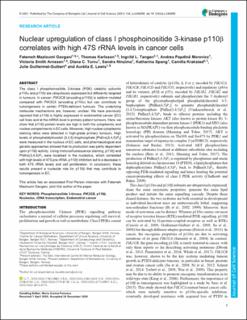Nuclear upregulation of class I phosphoinositide 3-kinase p110β correlates with high 47S rRNA levels in cancer cells
Mazloumi Gavgani, Fatemeh; Karlsson, Thomas; Tangen, Ingvild Løberg; Papdine Morovicz, Andrea; Arnesen, Victoria Smith; Turcu, Diana Cornelia; Ninzima, Sandra; Spang, Katharina Maria; Krakstad, Camilla; Guillermet-Guibert, Julie; Lewis, Aurelia Eva
Journal article, Peer reviewed
Published version

Åpne
Permanent lenke
https://hdl.handle.net/11250/2829384Utgivelsesdato
2021Metadata
Vis full innførselSamlinger
- Department of Biological Sciences [2289]
- Registrations from Cristin [10402]
Sammendrag
The class I phosphoinositide 3-kinase (PI3K) catalytic subunits p110α and p110β are ubiquitously expressed but differently targeted in tumours. In cancer, PIK3CB (encoding p110β) is seldom mutated compared with PIK3CA (encoding p110α) but can contribute to tumorigenesis in certain PTEN-deficient tumours. The underlying molecular mechanisms are, however, unclear. We have previously reported that p110β is highly expressed in endometrial cancer (EC) cell lines and at the mRNA level in primary patient tumours. Here, we show that p110β protein levels are high in both the cytoplasmic and nuclear compartments in EC cells. Moreover, high nuclear:cytoplasmic staining ratios were detected in high-grade primary tumours. High levels of phosphatidylinositol (3,4,5)-trisphosphate [PtdIns(3,4,5)P3] were measured in the nucleus of EC cells, and pharmacological and genetic approaches showed that its production was partly dependent upon p110β activity. Using immunofluorescence staining, p110β and PtdIns(3,4,5)P3 were localised in the nucleolus, which correlated with high levels of 47S pre-rRNA. p110β inhibition led to a decrease in both 47S rRNA levels and cell proliferation. In conclusion, these results present a nucleolar role for p110β that may contribute to tumorigenesis in EC.